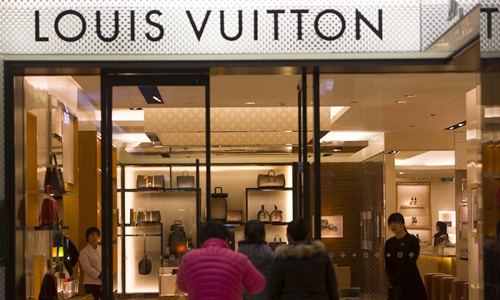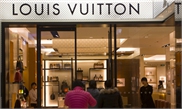
China is the world's top consumption market for luxury products and contributes over half of global sales. Photo: cnsphoto
One of the world's largest luxury brands the LVMH Group reported on Monday a strong recovery in the second quarter in China, despite impacts from the COVID-19 pandemic on its global revenue in the first half of 2020.
The luxury group, which owns brands including Louis Vuitton, Christian Dior and Moët Hennessy, said in its report that its revenue recorded 18.4 billion euros ($21.6 billion) in the first half of 2020, down 27 percent compared to the same period last year, and its net profit dropped 84 percent.
However, the French conglomerate's business saw "exceptional resilience" to the COVID-19 crisis, and there has been a strong rebound in China in particular, according to its financial report.
Luxury brands have been facing a tough market outlook since the start of the coronavirus crisis, as a result of the closure of many stores and manufacturing sites. According to statistics compiled by Bain & Company, a consulting firm, the luxury goods market may have contracted by around 25 percent in the first quarter of 2020.
More luxury brands are turning to China for positive growth amid the global downturn during the COVID-19 pandemic. Kering, another luxury brand group and the parent group of Gucci, Alexander McQueen and Yves Saint Laurent, saw its overall revenue hugely affected by the coronavirus. As of April, only 15 percent of the company's stores reopened globally, with its Chinese stores among the earliest.
For Kering, China is also the only market in the Asia-Pacific region where sales rose, with a 6.4 percent positive growth in the first half of 2020. According to the company's financial report, its business in the Chinese mainland was boosted by strengthened consumer spending power and an uptick in economic activities.
Gucci, one of the most notable brands under Kering, saw its sales in the Asia-Pacific region contract 24.6 percent, in sharp contrast to its business in China, which has been seeing a robust growth since mid-April, according to the financial report.
Global Times


